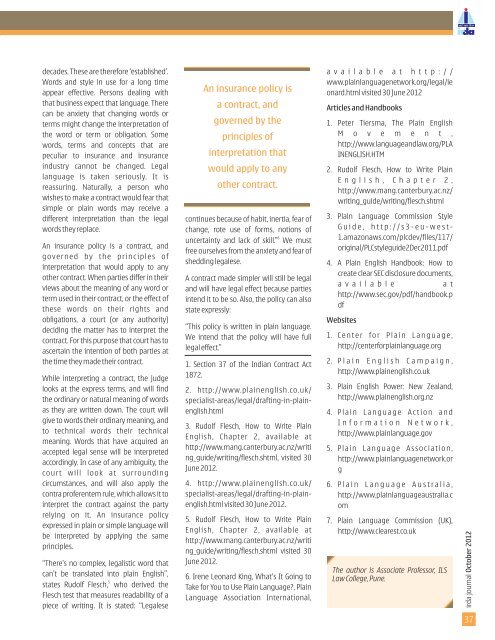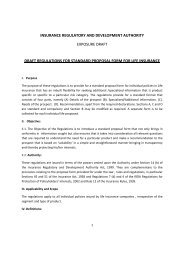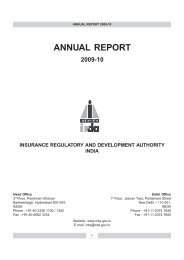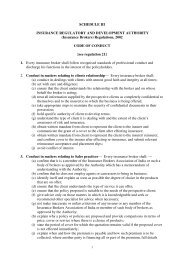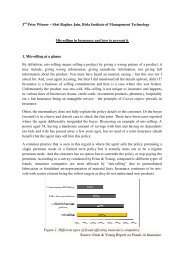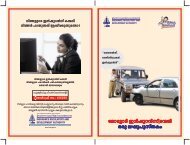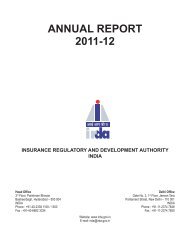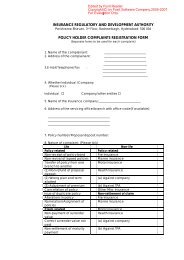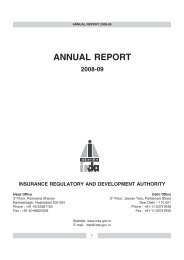'ÃÄ ÃflßĸÄ⧠â¢Ä±âU Ãflâ§Äâ ŽËÄÃÅâ§âUÃ¡Ä - IRDA
'ÃÄ ÃflßĸÄ⧠â¢Ä±âU Ãflâ§Äâ ŽËÄÃÅâ§âUÃ¡Ä - IRDA
'ÃÄ ÃflßĸÄ⧠â¢Ä±âU Ãflâ§Äâ ŽËÄÃÅâ§âUÃ¡Ä - IRDA
You also want an ePaper? Increase the reach of your titles
YUMPU automatically turns print PDFs into web optimized ePapers that Google loves.
decades. These are therefore ‘established’.Words and style in use for a long timeappear effective. Persons dealing withthat business expect that language. Therecan be anxiety that changing words orterms might change the interpretation ofthe word or term or obligation. Somewords, terms and concepts that arepeculiar to insurance and insuranceindustry cannot be changed. Legallanguage is taken seriously. It isreassuring. Naturally, a person whowishes to make a contract would fear thatsimple or plain words may receive adifferent interpretation than the legalwords they replace.An insurance policy is a contract, andgoverned by the principles ofinterpretation that would apply to anyother contract. When parties differ in theirviews about the meaning of any word orterm used in their contract, or the effect ofthese words on their rights andobligations, a court (or any authority)deciding the matter has to interpret thecontract. For this purpose that court has toascertain the intention of both parties atthe time they made their contract.While interpreting a contract, the judgelooks at the express terms, and will findthe ordinary or natural meaning of wordsas they are written down. The court willgive to words their ordinary meaning, andto technical words their technicalmeaning. Words that have acquired anaccepted legal sense will be interpretedaccordingly. In case of any ambiguity, thecourt will look at surroundingcircumstances, and will also apply thecontra proferentem rule, which allows it tointerpret the contract against the partyrelying on it. An insurance policyexpressed in plain or simple language willbe interpreted by applying the sameprinciples.“There’s no complex, legalistic word thatcan’t be translated into plain English”,5states Rudolf Flesch, who derived theFlesch test that measures readability of apiece of writing. It is stated: “LegaleseAn insurance policy isa contract, andgoverned by theprinciples ofinterpretation thatwould apply to anyother contract.continues because of habit, inertia, fear ofchange, rote use of forms, notions of6uncertainty and lack of skill.” We mustfree ourselves from the anxiety and fear ofshedding legalese.A contract made simpler will still be legaland will have legal effect because partiesintend it to be so. Also, the policy can alsostate expressly:“This policy is written in plain language.We intend that the policy will have fulllegal effect.”1. Section 37 of the Indian Contract Act1872.2. http://www.plainenglish.co.uk/specialist-areas/legal/drafting-in-plainenglish.html3. Rudolf Flesch, How to Write PlainEnglish, Chapter 2, available athttp://www.mang.canterbury.ac.nz/writing_guide/writing/flesch.shtml, visited 30June 2012.4. http://www.plainenglish.co.uk/specialist-areas/legal/drafting-in-plainenglish.htmlvisited 30 June 2012.5. Rudolf Flesch, How to Write PlainEnglish, Chapter 2, available athttp://www.mang.canterbury.ac.nz/writing_guide/writing/flesch.shtml visited 30June 2012.6. Irene Leonard King, What's It Going toTake for You to Use Plain Language?, PlainLanguage Association International,a v a i l a b l e a t h t t p : / /www.plainlanguagenetwork.org/legal/leonard.html visited 30 June 2012Articles and Handbooks1. Peter Tiersma, The Plain EnglishM o v e m e n t ,http://www.languageandlaw.org/PLAINENGLISH.HTM2. Rudolf Flesch, How to Write PlainEnglish, Chapter 2,http://www.mang.canterbury.ac.nz/writing_guide/writing/flesch.shtml3. Plain Language Commission StyleGuide, http://s3-eu-west-1.amazonaws.com/plcdev/files/117/original/PLCstyleguide2Dec2011.pdf4. A Plain English Handbook: How tocreate clear SEC disclosure documents,a v a i l a b l ea thttp://www.sec.gov/pdf/handbook.pdfWebsites1. Center for Plain Language,http://centerforplainlanguage.org2. Plain English Campaign,http://www.plainenglish.co.uk3. Plain English Power: New Zealand,http://www.plainenglish.org.nz4. Plain Language Action andInformation Network,http://www.plainlanguage.gov5. Plain Language Association,http://www.plainlanguagenetwork.org6. Plain Language Australia,http://www.plainlanguageaustralia.com7. Plain Language Commission (UK),http://www.clearest.co.ukThe author is Associate Professor, ILSLaw College, Pune.irda journal October 201237


